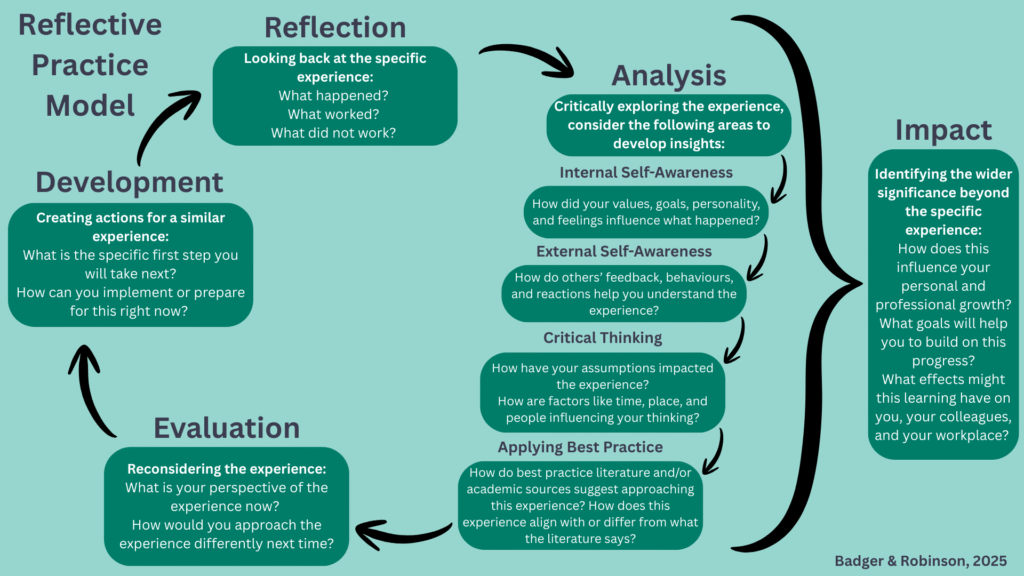
Moving beyond superficial reflection: A process model for meaningful and inclusive reflective practice
11 September 2025
Moving beyond superficial reflection: A process model for meaningful and inclusive reflective practice
Reflection is an essential skill, yet shallow or uncritical engagement can compromise its purpose and usefulness. This blog explores a clearer, process-focused model of reflective practice to support meaningful and inclusive learning.
Reflection can be a challenging skill to master. While the concept may sound straightforward, the ability to take a step back, analyse and evaluate experiences is a unique skill that does not necessarily develop naturally (Bulman et al., 2014). Reflection is also frequently the first thing to be neglected when people are busy or under pressure, even though it can be most valuable at these times (Ati et al., 2025). As Schön (1983, p.62) observed, it is reflection that turns experience into learning.
Reflection is an underpinning pillar of skills-based modules in higher education, often regardless of the disciplinary focus. The purpose is to develop students into learners who can reflect, both during their degrees but also transferring this as a key skill into the workplace (Tan, 2021).
The Main Challenges of Reflection
From the experience of leading skills modules, reflection can be particularly challenging for students to apply. The main challenges that we see are:
- Developing a depth of reflection that goes beyond the surface level description
- Approaching the reflection with critical thinking and analysis
- Meaningfully applying theory and best practice within reflections
- Creating next steps to develop skills, but also considering the wider impact
Literature exploring the challenges of reflection also highlights issues with superficial reflection, difficulty in understanding the purpose of reflection, lack of understanding of how to reflect, students’ perception that reflection is a time-consuming task and ethical and emotional impact considerations (Chan and Lee, 2021; Cheng and Chang, 2019; Tan 2021; Taylor et al., 2021).
A common strategy to making reflection easier for students is to use straight forward models, such as Rolfe et al.’s (2001), What, So What, Now What model. Whilst this can make reflection more accessible, it can also limit the depth of reflection that is achieved. These simple models can also be ambiguous as the process is not clear for all learners, thereby limiting how inclusive the model is. Whilst there are more in-depth theories around reflective practice, such as Eby (2000), who characterises it as using the skills of reflection, self-awareness and critical thinking, these are not built into structured, step-by-step reflective processes.
Our Reflective Practice Solution
To support individuals in engaging with reflective practice, we have developed a model that offers a clear, scaffolded process to guide the development of deeper and more meaningful reflections. This process-focused approach is designed to be more inclusive, providing structured steps and guiding questions that reduce ambiguity (Tan, 2021).
The five steps within the model:
- Reflection – looking back at the experience and providing an initial, short description.
- Analysis – critically exploring the experience to develop insights using the following areas: internal self-awareness, external self-awareness, critical thinking and applying best practice.
- Evaluation – reconsidering the experience following the analysis.
- Development – creating specific actions for a similar experience in the future.
- Impact – sitting outside the initial cycle, this stage encourages the learner to identify the wider significance beyond the specific experience, for their own growth, goals to build wider progress and wider impacts on others.

What makes this model different?
- Moving beyond description and superficial reflections, by giving structured support to facilitate analysis and evaluation.
- Providing a clear analysis process working through a range of different areas relating to reflective practice; internal and external self-awareness, critical thinking and applying best practice.
- Supporting learners to actively consider how they can critically apply either theory and/or best practice.
- Ensuring analysis is applied to the reflection by asking learners to reconsider the experience in the evaluation.
- Splitting the next steps into two stages allows for different areas of focus, short-term actions for similar situations, as well as the wider significance of their practice.
- Use of active, guiding questions that support deeper thinking and reduce ambiguity.
Implementing the Model
This academic year, this reflective practice model will be implemented in three modules. Firstly, it will be used in two skills modules, one for undergraduate degree apprenticeship students and another for postgraduate taught students. It will also be used within a large first-year undergraduate introductory module. This implementation will explore the use of this model and whether this structured process approach influences the depth and application of the reflective assessments, and we plan to write a follow-up post once we’ve reflected on the success of the model – so stay tuned later in the year for an update!
References
Ait Ali, D., Elhad, H., Dihadril, S., Ait Baja, Z., Jaa, M., Ait Ben Ali, S., Korchyou, Y., Loud, N., El Khiat, A., El Houate, B., Rizzo, A., Chirico, F., & Khabbache, H. (2025). Assessing stress and reflective practice among nursing students during clinical practicum. Teaching and Learning in Nursing. https://doi.org/10.1016/j.teln.2025.06.014
Bulman, C., Lathlean, J., & Gobbi, M. (2014). The process of teaching and learning about reflection: research insights from professional nurse education. Studies in Higher Education, 39(7), 1219–1236. https://doi.org/10.1080/03075079.2013.777413
Chan, C. K. Y., & Lee, K. K. W. (2021). Reflection literacy: A multilevel perspective on the challenges of using reflections in higher education through a comprehensive literature review. Educational Research Review, 32, Article 100376. https://doi.org/10.1016/j.edurev.2020.100376
Cheng, M. W. T., & Chan, C. K. Y. (2019). An experimental test: Using rubrics for reflective writing to develop reflection. Studies in Educational Evaluation, 61, 176–182. https://doi.org/10.1016/j.stueduc.2019.04.001
Eby, M.A. (2000) Understanding professional development. In: Brechin, A.H. Brown and Eby, M.A. Critical practice in health and social care. Sage.
Rolfe, G., Freshwater, D., Jasper, M. (2001) Critical reflection in nursing and the helping professions: a user’s guide. Basingstoke: Palgrave Macmillan
Schön, D. (1983) The reflective practitioner: How professionals think in action. Basic Books.
Tan, S. Y. (2021). Reflective learning? Understanding the student perspective in higher education. Educational Research (Windsor), 63(2), 229–243. https://doi.org/10.1080/00131881.2021.1917303
Taylor, S., Ryan, M., & Elphinstone, L. (2021). Generating genuine inclusion in higher education utilising an original, transferable, and customisable model for teaching and assessing reflective learning. Reflective Practice, 22(4), 531–549. https://doi.org/10.1080/14623943.2021.1933408
For more information please contact:
This post was written by Dr Lindsay Badger & Sian Robinson in the University of Exeter’s Business School.

